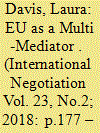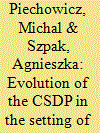| Srl | Item |
| 1 |
ID:
159775


|
|
|
|
|
| Summary/Abstract |
In the 1990s, the Democratic Republic of Congo (DRC) experienced complex wars involving local, national and regional combatants and conflict drivers, which formally ended in 2002. Violence continued and the government and rebel groups negotiated a series of peace deals, most recently in 2013. The European Union (EU) has been engaged in the DRC since the 1990s. This article proposes a model for conceptualizing EU mediation engagement within the conflict and process contexts, and the necessary capabilities for different types of EU mediation. It uses the DRC case study to examine how different EU capabilities were engaged in various peace processes which addressed multiple layers of a complex situation, and also engaged with other external actors in a multilateral environment. It concludes that the EU can be conceptualized as a multi-mediator and identifies the necessary capabilities for this.
|
|
|
|
|
|
|
|
|
|
|
|
|
|
|
|
| 2 |
ID:
188345


|
|
|
|
|
| Summary/Abstract |
The Common Security and Defense Policy (CSDP) represents an institutionalized attempt by European Union Member States to respond to the security challenges they confront. This paper discusses the evolution of this policy through the lens of political integration and international relations theories. The analysis integrates both the supranational and the national level, and demonstrates that European institutions have extended their privileges and sphere of influence with increasing organizational mandates. At the same time, participation by various levels in the creation of European security policies has evolved, and the inter-governmental level is often recognized as dominant. However, the question remains open whether this evolution of policy might be properly explained by several influential political theories that have shaped the European integration and security architecture in recent decades. Aspects of the CSDP institutional setting (its creation, goals and role) and the explanation of why security and defense policy is a complex dilemma of the integration process are discussed.
|
|
|
|
|
|
|
|
|
|
|
|
|
|
|
|